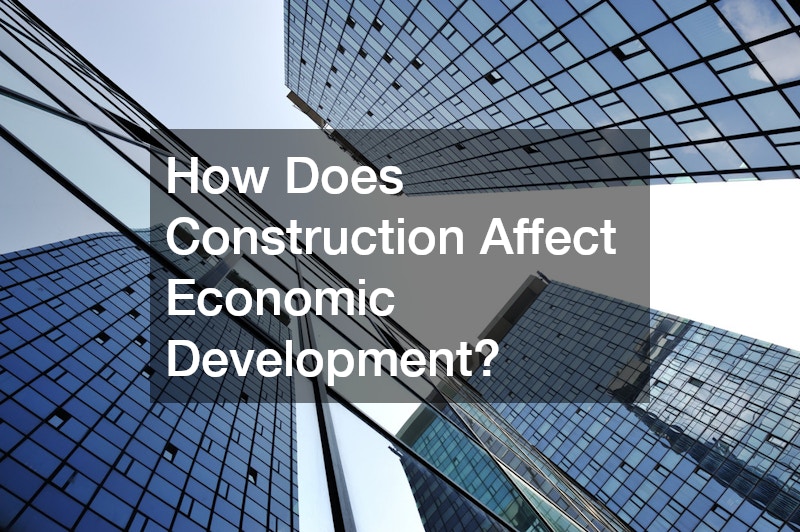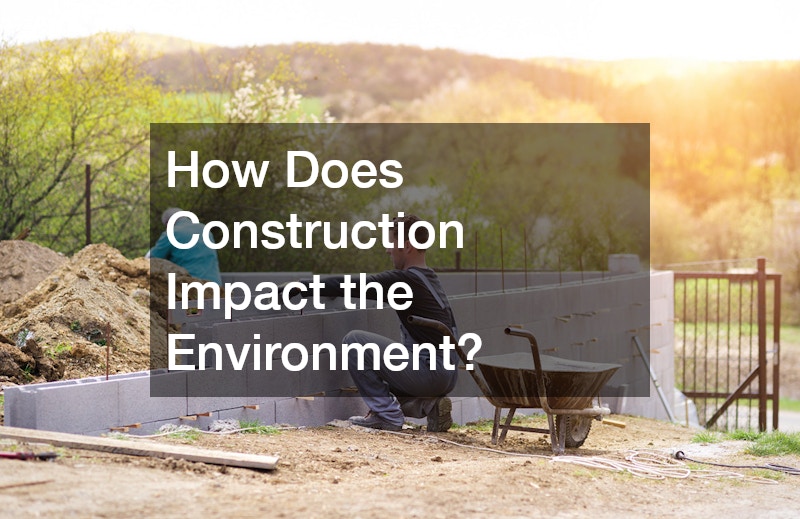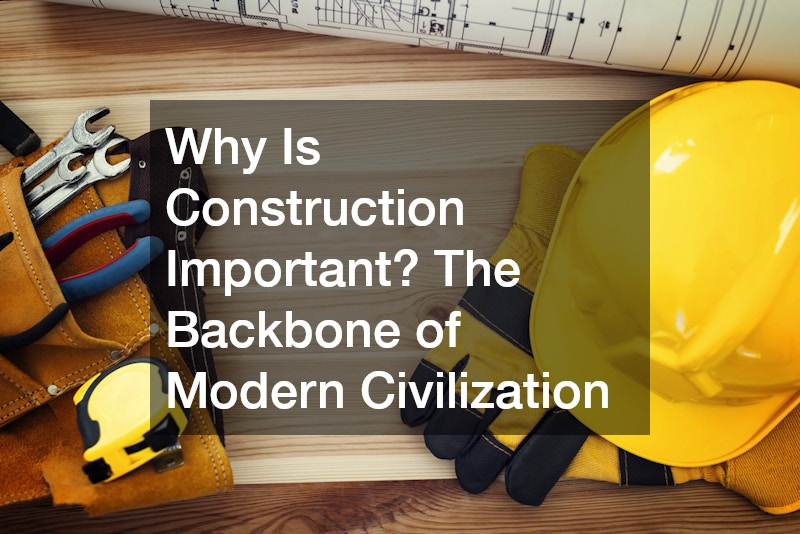The construction industry forms the bedrock of modern society, quite literally shaping the world we live in. Every building we enter, every road we travel, and every piece of infrastructure we rely on—from hospitals and schools to power plants and water systems—exists because of construction. It is a vital human endeavor that blends creativity, engineering, and functionality to meet the evolving needs of our growing populations.
Construction does far more than create physical structures; it connects communities, drives economic development, enables innovation, and reflects cultural identity. Whether it’s building affordable housing, expanding urban centers, or restoring historic landmarks, construction plays a central role in improving the quality of life and ensuring the sustainability of our cities and towns.
Yet, despite its visibility and importance, the construction industry’s influence is often underestimated or taken for granted. This article explores the many dimensions of construction—economic, environmental, technological, cultural, and beyond—while answering key questions and uncovering why construction is not just a necessity but a cornerstone of modern civilization. By understanding the broader impact of this essential industry, we gain insight into how it continues to shape the present and lay the foundation for our future.

1. How Does Construction Affect Economic Development?
Why is construction important? It plays a critical role in economic development, primarily through job creation and employment opportunities. The sector absorbs a large workforce ranging from unskilled laborers to skilled experts like structural engineers. When projects commence, they generate direct employment, which further boosts ancillary industries such as asphalt companies and pavers.
Besides providing employment, construction facilitates infrastructure development and industry growth. Essential facilities like roads and bridges cannot be established without the use of heavy equipment hauling and skilled crane operators. These developments are critical for enhancing trade and connectivity, ultimately leading to the growth of commerce and industry.
The impact of construction on the Gross Domestic Product (GDP) is another testament to its importance. The construction sector contributes significantly to a country’s GDP, acting as an economic powerhouse. Investments in construction result in substantial returns for economies, accentuating why construction is important for sustainable development.
2. What Is the Role of Construction in Urbanization?
In an age where urbanization is rapidly expanding, construction is at the forefront of developing residential buildings. The demand for residential spaces rises as populations shift from rural to urban areas. Construction companies meet this demand by employing advanced methods and infrastructure solutions such as crane rental services and equipment trailers to build high-rise apartments and housing complexes efficiently.
Commercial spaces are another avenue where construction plays a pivotal role in urbanization. Construction paves the way for shopping centers, office complexes, and industrial parks as cities expand. These developments necessitate precise planning, where structural engineers and crane service companies collaborate to create vital economic hubs.
Urban planning and design heavily rely on the construction industry to orchestrate functional living spaces. Well-designed urban areas are essential for city sustainability and quality of life. By incorporating modern architecture and sustainable practices, construction significantly influences how cities evolve, underscoring why construction is important in today’s world.
3. Why Is Sustainable Construction Important?
As environmental concerns escalate, sustainable construction has gained prominence. Why is sustainable construction important? It substantially reduces the carbon footprint by utilizing eco-friendly materials and innovative technologies. Construction companies, including those involved with roll-off dumpster rentals and demolition, are constantly seeking ways to minimize waste and enhance recycling efforts.
Energy efficiency in building design is another critical component of sustainable construction. By integrating technologies that reduce energy consumption, buildings not only become environmentally friendly but also economically resilient. Strategies such as advanced insulation and renewable energy installations emphasize why sustainable construction is important for a low-carbon future.
Sustainable construction also offers significant long-term economic savings. Environmentally friendly buildings tend to have lower operational costs, exerting less pressure on resources. This trend towards sustainability contributes to the financial viability of construction projects, showcasing why construction is important in shaping a sustainable economy.

4. How Does Construction Ensure Public Safety?
The construction industry is pivotal in ensuring public safety through diligent adherence to building codes and safety standards. Why is construction important for safety? The implementation of strict regulations ensures that structures are safe and sound. Structural engineers play a vital role in designing buildings that can withstand natural disasters and other unforeseen events.
Inspection and compliance measures are essential in maintaining safety standards. Routine inspections by government bodies and compliance with safety protocols ensure that construction sites adhere to legal and safety regulations. Companies specializing in heavy equipment hauling and crane services must comply with these standards to operate safely.
Why is construction important for community well-being? It provides safe and secure environments for individuals to live and work. By adhering to stringent safety precautions and modern engineering principles, the construction industry enhances public trust and community welfare.
5. What Are the Technological Advancements in Construction?
Technological advancements have revolutionized the construction industry in recent years. Why is construction important in technology? Innovations like drones and robotics provide unprecedented accuracy and efficiency in surveying and monitoring construction sites. These technologies reduce human error and streamline construction processes, making them crucial assets for modern building projects.
The implementation of Building Information Modeling (BIM) represents a significant leap forward in construction technology. BIM allows for comprehensive project visualization, ensuring effective collaboration among asphalt companies, pavers, and structural engineers. This technology enhances planning and reduces project timelines and costs.
The adoption of sustainable building materials is another major development within the industry. Advanced materials not only enhance structural integrity but also contribute to environmental sustainability. Utilizing these advancements accelerates the movement towards smart and sustainable cities, illustrating why construction is important in modern innovation. Plus, we can’t forget about how convenient roll off dumpster rentals are, right?
6. Why Is Infrastructure Construction Vital?
Infrastructure construction is vital as it lays the groundwork for everyday activities. Why is construction important in infrastructure? Developing transportation networks such as roads, railways, and airports is crucial for enhancing mobility and economic progress. This aspect of construction requires coordinated efforts from multiple disciplines, including crane service operations and asphalt companies.
Construction of public facilities, such as hospitals, schools, and emergency services, is instrumental for community development. These facilities provide essential services to citizens, making them indispensable for societal growth. Therefore, infrastructure construction is foundational to improving public health, education, and safety.
Infrastructure construction supports economic activities and trade by establishing reliable frameworks for business operations. Seamless logistics and efficient transport systems are crucial for domestic and international trade. The construction sector’s contribution to infrastructure illustrates why construction is important for economic resilience and prosperity.

7. How Does Construction Impact the Environment?
The construction industry has a profound impact on the environment, making environmental considerations imperative. Why is construction important for the environment? One of the primary concerns is resource consumption and waste management. The efficient use of resources like water and materials and proper disposal via roll-off dumpster rentals helps mitigate environmental impact.
Mitigation of environmental pollution is another vital construction concern. Sustainable practices and cleaner technologies lessen pollution, contributing to a healthier planet. Construction companies can employ advanced machinery and eco-friendly materials to limit emissions and environmental degradation.
Integration of green spaces within urban landscapes enhances environmental quality and provides recreational areas for city dwellers. Parks, gardens, and green roofs are fundamental in reducing pollution and improving air quality. These environmental initiatives underscore why construction is important for ecological balance.
8. Why Is Innovation in Construction Important?
Innovation in construction enhances efficiency and reduces costs, improving overall industry performance. Advancements in technology like 3D printing and prefabrication have revolutionized building methods, reducing project timelines significantly. Why is construction important? Because it continues to evolve, adapting innovative practices that promote progress and efficiency.
Improving worker safety and productivity is paramount within the construction industry. Innovations such as wearable technology and automated machinery enhance safety protocols and operational efficiency. By prioritizing workforce safety, construction maintains a robust work environment, offering vital answers to why construction is important.
Developing smart and sustainable cities is a future-forward approach driven by construction innovation. Technologies like IoT (Internet of Things) and smart buildings are now integral to urban development. This shift towards innovation highlights why construction is important for future-proofing cities.
9. What Challenges Does the Construction Industry Face?
The construction industry faces multiple challenges that require strategic solutions. One significant challenge is the skilled labor shortage, which affects project timelines and quality. Addressing this shortage involves investments in training and education, emphasizing the essential role of skilled personnel in answering the question of why construction is important.
Regulatory and compliance challenges also pose significant hurdles for the construction industry. Navigating complex legal frameworks can delay projects and increase costs. Construction companies must employ effective compliance strategies to mitigate these issues while emphasizing why construction is essential to overcoming these obstacles.
Economic volatility and market uncertainties impact the construction sector profoundly. Fluctuating material costs and market conditions can challenge project viability. By developing robust economic strategies, the construction industry shows resilience, illustrating why construction is important for economic stability.

10. How Does Construction Influence Cultural Heritage?
Construction significantly influences cultural heritage by preserving, restoring, and celebrating the built history of civilizations. Historic buildings, monuments, and architectural landmarks are more than just old structures—they are tangible links to our collective past. They embody the values, craftsmanship, and stories of earlier generations. Through skilled restoration efforts, construction professionals play a vital role in maintaining these connections, allowing communities to preserve their cultural identities for generations to come.
Why is construction important in this context? Because without it, historical sites would deteriorate beyond repair, and with them, vital pieces of cultural memory would be lost. Specialized structural engineers, conservation architects, and heritage masons work meticulously to stabilize aging foundations, repair intricate details, and update older buildings to meet modern safety standards—all while maintaining historical authenticity. This careful balance between preservation and modernization ensures that historical significance is not sacrificed for functionality.
Moreover, architectural innovation enables communities to express evolving cultural identities. Modern construction techniques make it possible to merge traditional design elements with contemporary forms, creating buildings that honor the past while reflecting the present. This fusion fosters civic pride and helps cities craft unique, recognizable identities. Signature buildings, cultural centers, and public spaces become symbols of local heritage, deeply rooted in both form and function.
Tourism and local identity are directly impacted by the thoughtful preservation of cultural heritage through construction. Heritage tourism—visiting sites of cultural and historical importance—generates significant revenue for local economies, supports small businesses, and creates jobs. More importantly, it promotes intercultural understanding and appreciation. Cities and towns that invest in the restoration of historic landmarks often become cultural destinations, reinforcing the idea that well-executed construction contributes not only to aesthetics but to economic vitality and global cultural exchange.
Ultimately, the intersection of construction and culture is where memory meets innovation. It exemplifies how the industry doesn’t just shape skylines—it safeguards legacies. By protecting historic structures and promoting culturally meaningful architecture, construction proves itself to be fundamental to cultural sustainability, identity, and the ongoing narrative of human history.
Conclusion
Construction is indubitably the backbone of modern civilization, influencing nearly every aspect of how we live, work, and interact with the world around us. From towering skyscrapers and intricate transportation networks to the preservation of historic landmarks and the rise of smart cities, the construction industry serves as both a reflection of human achievement and a foundation for future progress.
Its impact spans far beyond physical structures. Economically, construction stimulates growth, generates employment, and boosts national productivity. Socially, it provides the spaces where communities gather, children learn, and families thrive. Environmentally, it is increasingly becoming a force for positive change through sustainable practices and eco-conscious design. Technologically, it continues to evolve with innovation—bringing efficiency, precision, and resilience to how we build.
Understanding why construction is important helps us not only appreciate the visible results of the industry but also recognize the strategic planning, skilled labor, and ongoing innovation that make it all possible. It sheds light on the sector’s challenges—such as labor shortages, environmental concerns, and regulatory complexities—and inspires us to support solutions that ensure its continued success.
As we look to the future, a thriving construction industry will be key to creating sustainable cities, resilient infrastructure, and inclusive growth. By valuing and investing in construction, we lay the groundwork—both literally and figuratively—for a safer, smarter, and more equitable world.


